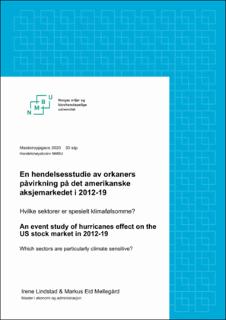| dc.description.abstract | The purpose of this master thesis is to investigate how the US stock market is affected by hurricanes. In this thesis, we look at how six sectors (communication services, consumer staples, health care, energy, insurance & utilities) were affected by the five most costly hurricanes (Harvey, Maria, Sandy, Michael & Florence) that hit the United states in 2012-19. The study includes 90 companies from S&P 500.
The thesis attempts to identify any abnormal return in the six selected sectors. We have hypothesized whether these sectors react positively, negatively or have no impact of hurricanes. Our analyzes were performed using the event study methodology of MacKinlay (1997). We have used both the market model and a two-factor model to calculate abnormal returns. The event window consists of 46 days: 15 days before the event day, the event day and 30 days after the event day. The actual event day is when the hurricanes made landfall.
Results from our analyzes show different reactions to the US stock market depending on the different hurricanes. We find both positive and negative abnormal returns in the different sectors. In utilities, we find several statistically significant abnormal returns, but we find only few statistically significant abnormal returns in the other five sectors. Although there are few statistically significant abnormal returns, we would still say that hurricanes have an economic significant impact on these sectors, as there have been large movements in the event window. In utilities, communication services and health care, there has been greater movements in the abnormal returns after the event day (0, +30) compared to period before the event day (-15, -1). These findings indicate that some sectors are more sensitive to the hurricane itself than hurricane alerts. In insurance, consumer staples and energy, we see large movements in abnormal returns both before and after the event day.
This study concludes that hurricanes have a negative economic significant impact on energy and communication services, and positive economic significant impact on health care and insurance, while utilities and consumer staples are virtually unaffected by hurricanes. | en_US |

